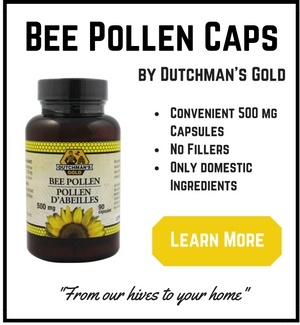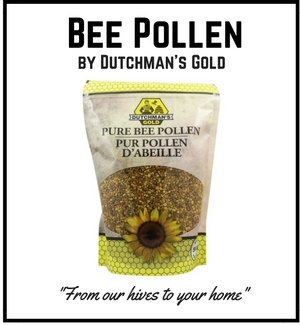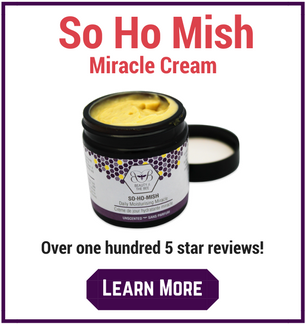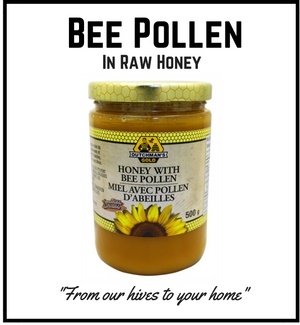Bee Pollen Research & Studies
I am a real science buff and scour the scientific journals weekly for the latest bee pollen research and studies. As I come across them, I will publish them here.
I often get asked why there are not more bee pollen studies done. Unfortunately, it comes down to money. Studies are only done on a substance if someone (usually a company) can patent the ingredient and then profit from it. But you can't patent bee pollen so studies are few and far between.
Bee Pollen Research on Allergies
Consider the following bee pollen research as reported in the Journal of Allergy:
• 73 % of patients with hay fever averaged a 75% improvement in their symptoms when given Bee Pollen orally
• 78% of asthma patients averaged a 75% improvement after taking Bee Pollen
• 17.8% of hay fever sufferers and 33.3% of asthmatics experienced a complete improvement on oral Bee Pollen supplements
• the earlier Bee Pollen supplementation was begun prior to allergy season, the greater the rate of its success
Allergy Relief Study
And here is another positive piece of bee pollen research as reported in the Journal of Phytotherapy Research in April 2009:
Scientists at the Juntendo University School of Medicine in Japan fed mice bee pollen on a daily basis.
What they found was that by doing this, the number of mast cells activated was reduced in a dose dependent manner (the more bee pollen they gave the mice, the better the result). Mast cells are responsible for the production and release of histamine when you come into contact with an allergen. Histamine triggers the inflammatory response you know as sneezing, itching, a runny nose and coughing. Hence the term anti-histamine when it comes to allergy drugs.
So to reduce the amount of histamine being produced is VERY good for allergy sufferers. And this study confirms bee pollen's ability to do this!
Bee Pollen Research on Boosting Reproductive Performance
The effect of bee pollen on productive and reproductive performances of adult buck rabbits and their offspring was studied during winter and summer seasons.
Forty New Zealand White bucks were equally divided among four groups feeding the same commercial diet and receiving a water solution containing, respectively, 0 (control), 100, 200 and 300 mg bee pollen/kg body weight, twice per week along two experimental periods. The experimental periods were listed for ten weeks both during winter (30-40 weeks of age) and summer seasons (56-66 weeks of age). During the trials, body weight, body weight gain, total feed intake, semen quality, fertility and blood constituents were determined. Fertility was determined after natural mating with no treated females.
For each season, 80 weaned rabbits obtained from the bucks of the control group were equally divided (20 per group) among 4 levels (0, 100, 200 and 300 mg/kg BW) of bee pollen, given as a water solution twice per week. The offspring sired by bucks given 100, 200 and 300 mg (20 for each group and season) were not administrated bee pollen.
The effect of bee pollen on growth performance of rabbits was studied from 4 to 12 weeks of age. Bee pollen at 200 mg/kg BW significantly improved semen quality, increased fertility percentage, improved biochemical profiles of blood and helps outstanding of bucks during both seasons.
The same concentration of bee pollen increased body weight gain and survival rate and reduced feed intake and feed conversion ratio of offspring up to 12 weeks of age.
Bee Pollen Extends Lifespan of Mice
Journal of ApiProduct & ApiMedical Science, Vol. 2 (4) pp. 156 - 160
We previously reported that three different inbred strains of mice (CBA/Ki, C3H/f/Ki and C57BI/Ki) survived in a healthy condition when fed only a bee pollen granules diet and drinking water for 365 days.
Similarly, Sprague-Dawley rats showed comparable skeletal and organ growth and development when fed a similar bee pollen diet during a twelve-week period as compared to control animals fed a standard laboratory diet.
It was the purpose of this study to determine how long the survival time of CBA/Ki mice could be extended beyond 365 days when fed only bee pollen granules and water as compared to controls.
Control mice survived a mean of 477 days (389-548) with 100% diagnosed with renal amyloidosis at autopsy which characterized this strain of mice in our laboratory. All pollen fed mice appeared healthy when euthanized at 600 days of age. Survival times were compared with a log rank test. Also, there was no evidence of pathology particularly in the kidneys.
These unexpected findings could be interpreted as being consistent with the genetotrophic disease concept proposed more than fifty years ago, namely, that bee pollen contains either a unique nutrient or a higher level of one or more nutrients that may be lacking or at a lower concentration in the standard diet which will then circumvent partial genetic blocks in the metabolic assembly line.
Journal of ApiProduct & ApiMedical Science, Vol. 2 (4) pp. 156 - 160
Bee Pollen Boosts Rabbit Health
In this bee pollen research study, forty New Zealand White (NZW) rabbit does were equally divided among four groups feeding the same commercial diet and receiving a water solution containing, respectively, 0 (control), 100, 200 and 300 mg bee pollen/kg body weight (BW), 1 week before and after mating during moderate (October-February) and hot seasons (May-September) for three consecutive mating in each season.
Does were mated with non-treated adult NZW male rabbits 11 days after kindling. Body weight of does, number of service per conception, conception rate, feed intake, litter size, milk production, blood constituents, weight of kits from birth up to weaning and survival rate were determined. For each season, 80 weaned rabbits originated from the does of the control group (untreated does) were equally divided into four groups (0, 100, 200 and 300 mg/kg BW) of bee pollen, given as a water solution twice per week from 4 to 12 weeks of age.
The kit of the does given 100, 200 and 300 mg/kg BW did not receive bee pollen during the growing period (4-12 weeks of age). The effect of bee pollen on growing rabbit's performance was studied from 4 to 12 week of age.
Bee pollen at 200 mg significantly increased body weight of does, conception rate, milk yield, litter size; improved biochemical profiles of blood and helps outstanding of does during both seasons.
The same dose of bee pollen significantly increased kit growth and their survival rate until weaning. Growth and feed conversion ratio (FCR) of kits from the treated does during 4-8 weeks of age were significantly better than growth of kits from the untreated does that administrated bee pollen during 4-12 weeks of age. Meanwhile, during the following period (8-12 weeks of age) growth and FCR of kits given bee pollen from the untreated does were significantly better than that of treated does.
Anim Physiol Anim Nutr (Berl), 2010 Sep 29
Tips on how to safely buy bee pollen
Return from Bee Pollen Research to Bee Pollen Buzz
|
|
|













New! Comments
Do you have something to say about what you just read! Leave me a comment in the box below. I'd love to hear from you!